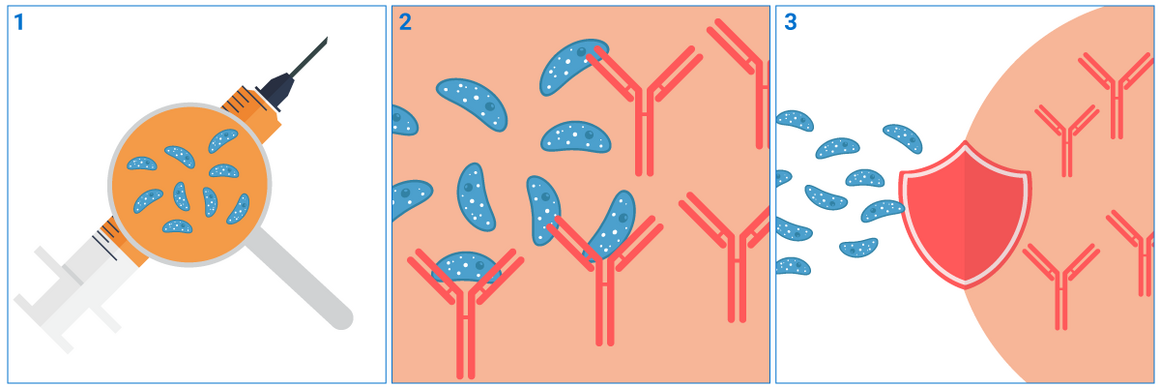
You receive a shot, but you’re not actually getting sick
It feels strange. You’re injected with something, yet you’re told it’s not the disease. The body reacts—slightly. Maybe a sore arm. Maybe a mild fever. But not illness. Just rehearsal. Vaccines introduce a copy, not the enemy. The immune system studies, not suffers.
The body sees a piece of a virus and immediately starts building defenses
It’s a protein. A shell. A shadow. Not the full thing. But enough to alert the system. Immune cells gather. Analyze. Start building tools. Antibodies begin forming. White cells memorize the shape. The body is taking notes, even if you feel nothing.
Antibodies don’t just float—they mark the threat, and remember it for later
They don’t attack directly. They point. Tag. Signal. These are the scouts. When the real virus shows up, the system responds faster. Stronger. It’s not guessing anymore. It’s recalling. That’s why symptoms stay mild—even if exposed.
Memory cells are the true investment—silent, invisible, and long-lasting
They don’t fight right away. They wait. Watch. Months later, even years, they still remember. A familiar enemy appears, and they move instantly. Faster than your brain can react. These cells don’t need to relearn. They’re trained to respond in seconds.
You might feel tired after a vaccine, but that’s the body doing its job
The fatigue isn’t weakness. It’s effort. Your immune system is building something. Training is work. The fever, the aches—they’re signs of engagement. Not damage. The stronger the signal, the deeper the memory sometimes becomes.
Different vaccines use different strategies, but all aim for the same goal
Some use inactivated viruses. Others use mRNA. Or protein fragments. The delivery changes. But the point stays: recognition. Familiarity. The goal is defense without danger. Each type teaches the immune system a slightly different dialect of the same language.
Booster shots aren’t failures—they’re reminders
Memory fades. Time wears down sharpness. Boosters reawaken the response. They don’t start from scratch. They strengthen what’s already known. Like revising an old lesson, not learning a new one. Especially when variants shift the target’s shape.
The immune system doesn’t forget everything, but it needs refreshers to stay sharp
Just like muscles, immune memory can weaken. Especially with age. Or time. A booster renews that edge. Sometimes with a new formula. Sometimes the same one again. Both can help rebuild readiness. Not because the first failed—but because defense is ongoing.
Vaccines don’t just protect you—they slow the spread by shortening infection
Even if you get infected, it clears faster. There’s less virus to spread. The immune system jumps ahead. Others are protected indirectly. That’s community immunity. It doesn’t require perfection—just consistency.
In rare cases, the immune system overreacts—but this is the exception, not the rule
Reactions happen. Some are stronger. But they’re rare. And closely tracked. Most side effects are mild. Serious ones get investigated fast. The risk of disease often outweighs the rare risk of response. Vaccines remain a controlled rehearsal—safer than real battle.
The first vaccines were developed through trial and error—but now, the process is different
Centuries ago, it was observation. Guesswork. Now it’s mapped. Sequenced. Built with intention. Genetic code becomes a formula. The body receives instructions. And follows them. Science has turned survival into planning.
Your immune system doesn’t speak in words—it learns through patterns
It doesn’t need language. Just repetition. Just shapes. One protein teaches more than a sentence. Vaccines show those patterns early. So the system recognizes them late. When it matters. When time is short.
You might not feel anything at all—but your system still remembers
No fever. No fatigue. But something happened. Quietly. Underneath. Immune education isn’t loud. It just leaves the system smarter. Faster. Less surprised.
Not all vaccines last forever—some teach for life, others for a season
Tetanus protects for years. Flu, just a season. It depends on the pathogen. Some viruses shift constantly. Others stay still. The immune system adjusts. And so does vaccine timing. Durability isn’t just about strength—it’s about change.
